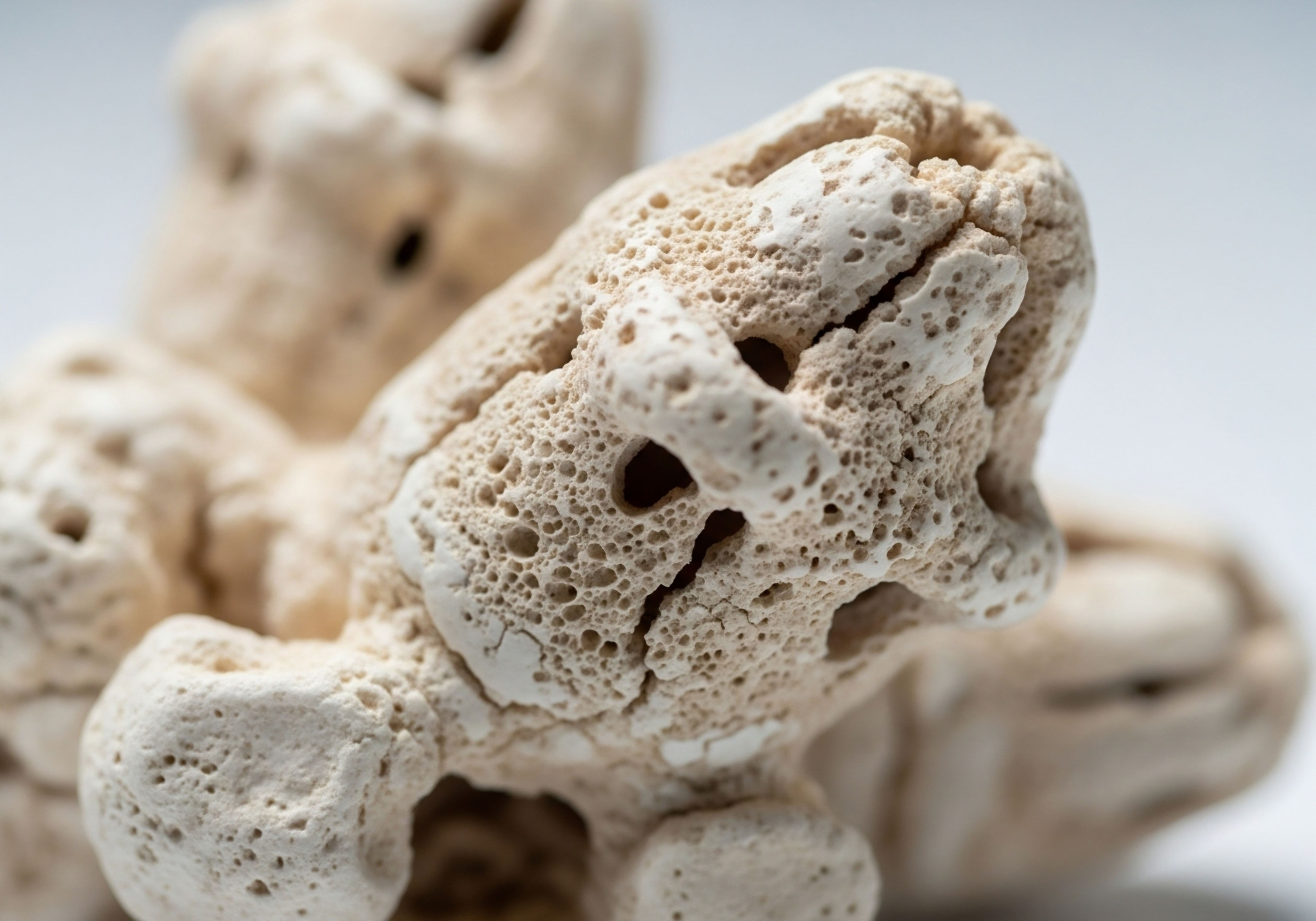

The Endocrine System’s Nocturnal Symphony
The quest for peak human performance and sustained vitality often focuses on overt strategies ∞ rigorous training, precision nutrition, and targeted supplementation. Yet, the true command center, the silent orchestrator of our biological potential, operates primarily in the hours of darkness.
Sleep, often relegated to a secondary consideration, holds dominion over the intricate network of hormones that govern every aspect of our physiological existence. This nocturnal process constitutes the ultimate recalibration for the body’s internal systems, a period of profound biological reorganization that directly dictates our capacity for strength, clarity, and longevity.
Understanding this relationship demands a mechanistic perspective. During the deepest phases of sleep, the body undergoes a systemic reset. Consider the hypothalamic-pituitary-gonadal (HPG) axis, the central regulator of reproductive and anabolic hormones. Optimal function of this axis depends on an undisturbed sleep architecture.
Disruptions here translate directly into compromised testosterone production in men and balanced estrogen and progesterone cycles in women, impacting muscle accretion, bone density, and cognitive drive. These hormonal systems do not merely operate; they engage in a complex dialogue, and sleep provides the essential environment for that conversation to proceed without interruption.

Growth Hormone ∞ Night’s Anabolic Signal
One of the most potent anabolic and regenerative hormones, human growth hormone (HGH), experiences its most significant pulsatile release during deep, slow-wave sleep. This surge initiates cellular repair, tissue regeneration, and fat metabolism. Without adequate, high-quality sleep, these critical restorative processes diminish, leading to a cascade of suboptimal outcomes.
The body’s ability to repair micro-tears from training, synthesize new proteins, and mobilize fat stores for energy depends heavily on this nocturnal HGH release. A compromised sleep pattern directly compromises this fundamental anabolic signaling.
“Deep, slow-wave sleep accounts for up to 70% of daily human growth hormone secretion, a vital signal for cellular repair and metabolic regulation.”

Cortisol ∞ The Stress Hormone’s Rhythmic Control
Cortisol, often termed the stress hormone, follows a distinct circadian rhythm. Its levels should peak in the morning, providing alertness, and gradually decline throughout the day, reaching their nadir at night. Sleep acts as the primary regulator of this rhythm. Insufficient sleep or irregular sleep patterns elevate evening cortisol, disrupting the natural cycle.
Chronically elevated cortisol levels drive catabolism, impair immune function, reduce insulin sensitivity, and accelerate systemic aging. Sleep provides the essential mechanism for resetting this critical neuroendocrine axis, ensuring cortisol acts as a performance enhancer, not a systemic degradant.

Metabolic Harmony ∞ Insulin and Leptin Sensitivity
Beyond anabolic and stress hormones, sleep profoundly impacts metabolic health. Just one night of sleep deprivation significantly reduces insulin sensitivity, driving the body toward a pre-diabetic state. This impairment compromises glucose uptake by cells, leading to elevated blood sugar and increased fat storage. Simultaneously, sleep influences the appetite-regulating hormones, ghrelin and leptin.
Sleep restriction elevates ghrelin, a hunger-stimulating hormone, while suppressing leptin, which signals satiety. This dual effect drives increased caloric intake and an inclination toward less nutritious food choices, sabotaging body composition goals. The body’s capacity for efficient energy utilization and weight management stands as a direct consequence of sleep quality.


Mastering Circadian Rhythms for Hormonal Precision
Optimizing the hormonal command center requires a deliberate, strategic approach to sleep. This extends beyond merely allocating hours; it demands a deep understanding of circadian biology and environmental control. We aim to synchronize our internal rhythms with the natural light-dark cycle, creating an environment where hormonal systems can operate at their zenith.

Architecting the Sleep Sanctuary
The physical environment plays a paramount role. Your bedroom functions as a sanctuary, a dedicated space for deep recovery. It requires specific conditions to facilitate optimal hormonal signaling.
- Temperature Regulation ∞ A cooler environment, typically between 60-67°F (15-19°C), signals the body to initiate sleep. Lowering core body temperature facilitates melatonin production and deep sleep stages.
- Absolute Darkness ∞ Even minimal light exposure, particularly blue light, can suppress melatonin and disrupt circadian timing. Employ blackout curtains and eliminate all light-emitting devices from the sleep space.
- Noise Abatement ∞ Minimize auditory disruptions. White noise machines or earplugs create a consistent sound environment, buffering against external disturbances that can fragment sleep architecture.

Behavioral Synchronization ∞ The Daily Protocol
The daily routine significantly influences nocturnal hormonal events. Consistent actions reinforce robust circadian rhythms.
Maintaining a regular sleep-wake schedule, even on weekends, programs the body’s internal clock. This consistency stabilizes hormone release patterns, ensuring the timely secretion of growth hormone and the appropriate decline of cortisol. Light exposure also serves as a potent chronobiotic. Early morning sunlight signals wakefulness and helps set the circadian rhythm. Conversely, limiting artificial light exposure, especially blue light from screens, in the hours leading up to bedtime prevents melatonin suppression and promotes a smooth transition to sleep.

Nutritional and Activity Timings
Meal timing and exercise also impact sleep quality and hormonal balance. Consuming large meals close to bedtime can elevate core body temperature and divert metabolic resources, disrupting sleep. Aim for dinner several hours before sleep. Intense exercise, while beneficial for overall health, too close to bedtime can elevate core body temperature and stimulate the nervous system, hindering sleep onset. Schedule vigorous activity earlier in the day.


Temporal Imperatives of Hormonal Vitality
The impact of sleep on hormonal vitality unfolds across various temporal scales, from immediate metabolic responses to long-term longevity pathways. Recognizing these critical windows and persistent effects empowers a proactive stance toward biological optimization. The benefits accrue not as a sudden transformation, but through consistent adherence to principles that respect the body’s innate rhythms.

Immediate Hormonal Recalibration
The most immediate effects of optimized sleep manifest in metabolic and neuroendocrine function. A single night of quality sleep restores insulin sensitivity, balances ghrelin and leptin, and resets the cortisol awakening response. Athletes experience enhanced recovery and improved physical performance metrics. Individuals observe clearer cognitive function and improved mood stability. This immediate recalibration demonstrates the system’s inherent responsiveness to appropriate rest, highlighting sleep as a daily non-negotiable for acute performance.
“Chronic sleep restriction, even by an hour, can induce a physiological state akin to aging by a decade in terms of insulin sensitivity and hormonal balance.”

Sustained Optimization for Longevity
Over time, consistent, high-quality sleep acts as a powerful lever for longevity and sustained peak performance. Chronic sleep deprivation accelerates telomere shortening, increases systemic inflammation, and compromises immune surveillance. These are hallmarks of accelerated aging. Prioritizing sleep mitigates these degenerative processes, preserving cellular integrity and extending healthspan.
The long-term trajectory of hormonal health, encompassing robust thyroid function, balanced sex hormones, and resilient adrenal output, is profoundly shaped by consistent sleep hygiene. It becomes a foundational pillar for maintaining metabolic efficiency and cognitive acuity well into later years.

Addressing Age-Related Shifts
As individuals age, sleep patterns naturally change, often characterized by fragmented sleep and reduced deep sleep stages. This decline exacerbates age-related hormonal shifts, such as decreased growth hormone production and altered cortisol rhythms. Proactive sleep optimization becomes even more critical during these life transitions.
Targeted interventions, including environmental control and consistent behavioral protocols, can mitigate the negative impact of these changes, supporting the body’s capacity to produce and regulate hormones effectively. This strategic engagement with sleep stands as a powerful countermeasure against the passive acceptance of age-related decline, enabling individuals to maintain a robust hormonal profile.

The Unseen Architect of Biological Sovereignty
To truly command your biological destiny, you must first master the unseen hours. Sleep transcends a passive state of rest; it functions as the master control panel for your entire endocrine system. Every ambition, every peak performance metric, every measure of vitality and longevity traces its roots back to the quality and consistency of your nocturnal regeneration.
The “Vitality Architect” recognizes sleep as the ultimate foundational intervention, the silent partner in all human optimization. By meticulously engineering your sleep environment and ritual, you activate the profound physiological mechanisms that calibrate your hormonal output, sculpting a more resilient, potent, and sovereign biological self. This commitment stands as the single most powerful decision you can make for sustained excellence.



